
Electronic Technician
Skip to section:
About the role Career progression and training Salary and benefits Entry requirementsAs an Electronic Technician you will be the ship’s electronic expert. You will learn to maintain a wide range of cutting edge technological systems. Or you may specialise as a Weapon Technician, maintaining the ship’s arsenal of weapons and systems. You’ll have the opportunity to earn as you learn on board, sailing local and international waters, and sampling foods, cultures and scenic attractions of coastal port towns.
- ServiceNavy
- SpecialisationEngineering and Technical Trades
- LocationDevonport
-
Starting Trade Training$64,177
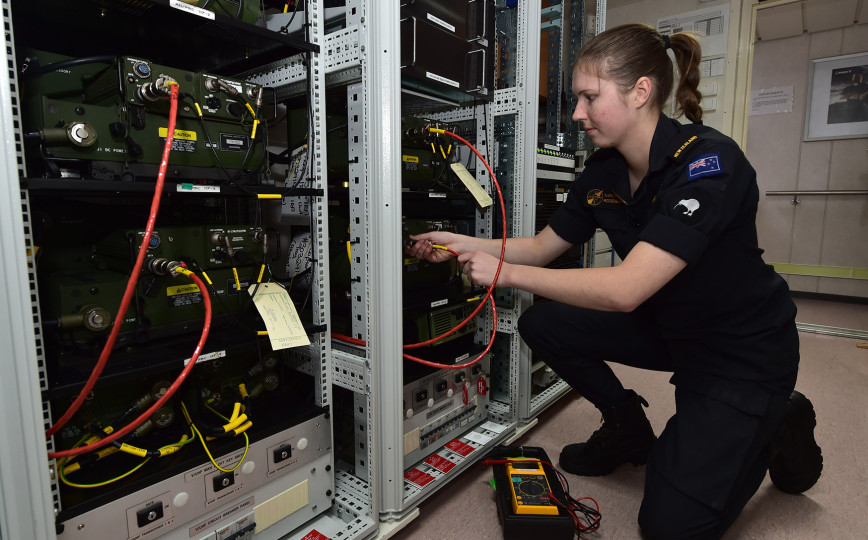
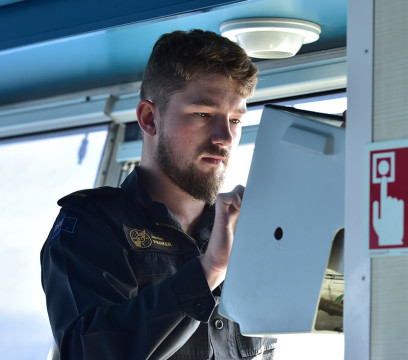
About the role
One of the key differences between warships and commercial ships is the advanced weapons, communications and sensor systems. As the ship’s electronic experts you will make a vital contribution towards ensuring that the ship is ready to complete operations and provide a ‘fight’ capability. You will help to maintain an extensive range of cutting edge, technologically advanced systems.
You will join the Navy as a general Electronic Technician, whereby you will gain an understanding of the ship’s weapons, communications, and sensor systems, before deciding on your specialisation as an ‘Electronic’ or ‘Weapon’ Technician towards the end of your initial technical training course.
As an Electronic Technician, your work will involve testing, maintaining and repairing the ship’s electronic equipment, which may include: the combat management system, data and satellite communication systems, information systems (including networks), Closed Circuit Television (CCTV), radar, sonar and navigation equipment.
As a Weapon Technician you will be responsible for the testing, maintenance and repair of the ship’s arsenal of modern and accurate weaponry, which may include: small arms like shot guns, pistols and rifles or larger weapons like 50 calibre machine guns, torpedoes, surface-to-air missiles, Phalanx close in weapons system, 25mm Bushmaster, the Typhoon/Mini Typhoon and the ANZAC Frigate’s 5 inch gun.
Job on base
Engineering positions on the naval base not only provide a break from life at sea but also provide an opportunity for you to gain further training and experience in areas such as ship maintenance and repair, technical administration and support to the fleet.
You will be assigned to one of our various maintenance departments, or the Weapon Engineering School for your own professional development or to support the learning of engineering students junior to you.
Job on deployment
Whilst employed on a ship, it is your responsibility to ensure the electronic sensors and communication systems are functional to provide the ability to locate, communicate and interrogate contacts of interest. Weapon Technicians must keep weapon systems maintained and in a state of operational readiness to provide the ship with the ability to ‘fight’ whether by air, surface or sub-surface.
Like everyone else onboard, you will participate in general shipboard duties and activities such as boat launch/recovery, leaving or bringing a ship to the wharf, crane operations, assisting helicopter landings, ship security or practising emergency responses to fires, flooding or machinery breakdowns.
While deployed there are always excellent opportunities to experience different ports and environments in both New Zealand and overseas. Imagine the delights in cities of the Pacific Rim and beyond!
We play with lots of different electrical equipment, from high powered radars to navigational systems. We also conduct periodic maintenance, because if anything breaks while we're at sea, we can't exactly go to the shop and get a new one!
Jamie Hudson
Leading Electronics Technician
Career progression and training
Career Progression
Basic Training
Job Training
Specialist Training
Your hard work, experience and training accomplishments as an Electronic or Weapon Technician is rewarded with civilian qualifications alongside promotions in rank and salary. You join the Navy as an Ordinary Rate completing Basic Training and Able Technician Training. After this specialist course you will fill positions on Naval Ships to consolidate what you have learnt through on the job training. As your skill and experience increase, you will be selected to complete your advanced technician and leadership training before being recommended for promotion to Leading Hand, typically around your fourth year of Service.
Upon enlistment into the Navy, you’ll be posted to Devonport Navy base in Auckland. Here you will do 16 weeks of basic military training to find out if you’ve got what it takes to be in the Navy, and learn various subjects including:
- Teamwork and support
- Naval history and customs
- Drill and parades
- Core mariner skills and weapons training
- First aid and firefighting
- Physical fitness
- Self-discipline
Following Basic Training, you will complete Able Technician training, also at Devonport Naval Base.
As an Electronic or Weapon Technician (ET or WT) you will initially train in the core disciplines of electro-technology and maintenance fitting through a combination of theory and practical courses. You will be thoroughly trained in fault diagnosis and repair methodologies including the use of state-of-the-art monitoring and analysis equipment.
ABLE TECHNICIAN COURSE
(46 weeks) Location: Devonport Naval Base (Auckland)
Subjects include:
- Electro-technology
- Safe Technician
- Workshop safety and skills via Manukau Institute of technology (MIT)
- Able Technician Common training
- Height safety operator
- Confined spaces operator
- Naval safety systems
- Power and distribution systems
Towards the end of this course you will branch into Electronic or Weapon specialisations, depending on the best match for your skills, personal preference and spaces available, then complete 5 weeks of ‘streamed training.’
WEAPONS AND ELECTRONICS COURSE
(5 weeks) Includes radar, navigation and communications systems theory, and an overview of small arms maintenance (personal protection weapons).
Don’t think your learning is limited to the classroom! You will spend the next two years at sea and ashore gaining on-the-job training and experience.
QUALIFICATIONS EARNED
When training as an Electronic or Weapon Technician, you’ll have the opportunity to achieve industry recognised trade qualifications such as the NZ Certificate (Level 3) in Electro-technology and an Electrical Service Technician (EST) licence after 18 months of practical service.
Once you’ve completed an advanced Technical Course, you’ll gain a NZ Certificate (Level 4) in Electronics Engineering or; Customer Premise Systems in one of the following strands:
- Structured Cabling – Performing installation and configuration of Network systems, analysis of network performance, diagnosis and repair of network equipment and systems.
- Control and Automation – Performing complex installation of systems, equipment or appliances with the necessary interface to associated systems.
- Signal Reception and Distribution - Performing installation and configuration of signal reception and distribution systems, analysis signal and data performance, diagnosis and repair of complex faults to restore optimal signal and data performance.
The Navy meets all costs of this training, which is usually completed in the first four years of an Electronic Technicians career. Travel and earn as you gain your qualification without the student loan!
As your career progresses, further opportunities for specialist training and higher education becomes available to you. This may include subsequent Level 4 qualifications, or a Level 6 Diploma during the Petty Officer course and pathways toward achieving Bachelor’s and Master’s degrees.
The Royal New Zealand Navy values diversity of knowledge and skills amongst its engineers and is very supportive of your continued professional development.
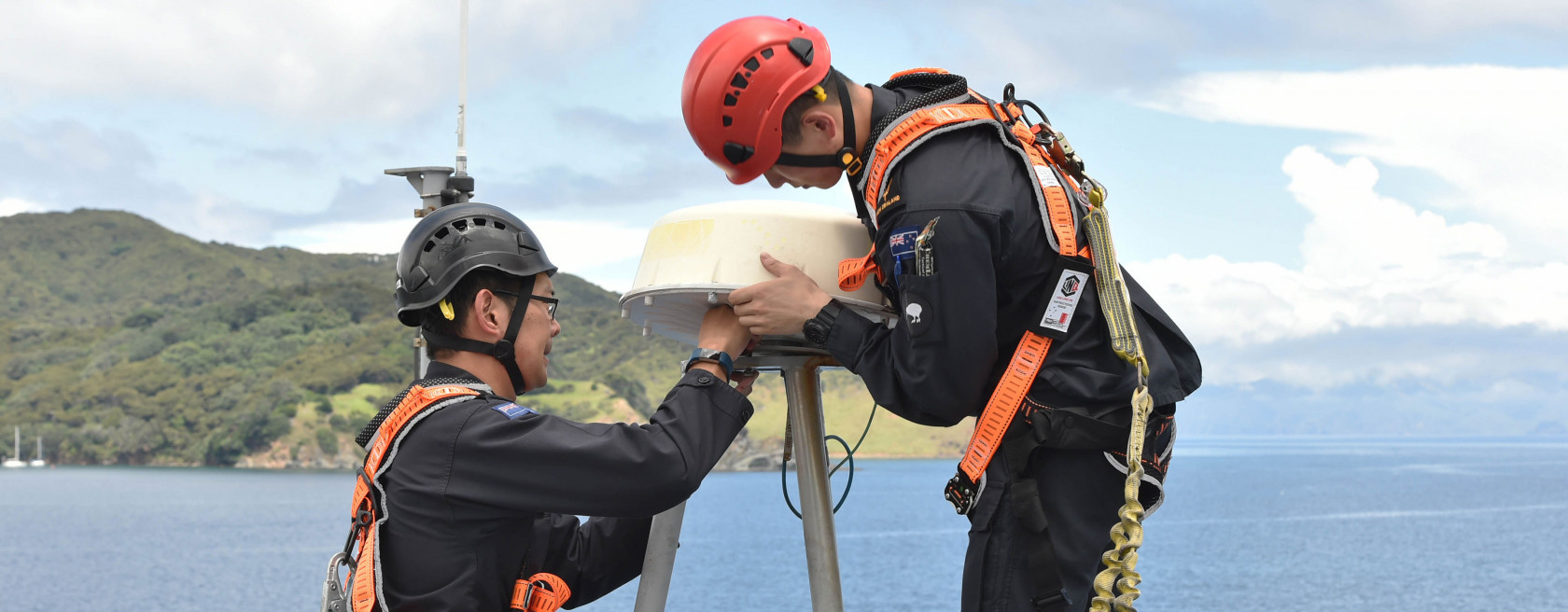
Salary and benefits
Careers in the Navy are well-rewarded, as well as being diverse and exciting. As you become more experienced and move up through the ranks, gaining additional skills and qualifications, you will see your salary rise accordingly.
$50,597
Under Initial Training
$64,177
Starting Trade Training
$129,061
Future Potential Earnings
Figures updated on July 1st 2023
Benefits and allowances
Earn a competitive salary while training or learning your trade, along with additional allowances for time spent in the field, at sea, overseas, or deployed on operations.
In addition to salary and allowances, other benefits of joining the New Zealand Defence Force include:
Access to your Service marae or tūrangawaewae
Sponsored tertiary study programmes at all levels
Free access to gyms and swimming pools on camp and bases
Opportunities to travel
Free and subsidised medical and dental care
Subsidised food and accommodation on camps and bases
Free and subsidised insurance cover
Help to buy a home and save for retirement
Entry requirements
Basics
Education
Fitness and Medical
Citizenship
Period of Service
- Be a minimum of 17 years of age upon entry.
- Be free of any criminal convictions.
NCEA Level 2 certificate. Find out more about the NCEA levels and certificate requirements.
Please note, the academic courses and unit standards that you will be required to pass as an Electronic/Weapon Technician are largely physics/maths based, and consist of Level 2 to Level 4 Unit Standards. If you have completed maths and some physics as part of your science credits (mechanics, electricity etc.), this will go a long way to help with your academic studies in the Navy.
- You must be medically fit for service.
- You must meet the minimum entry fitness standards.
- Colour perception requirements may apply.
There are strict citizenship and security requirements to gain the SV security clearance required for this trade.
Find out if you’re eligible here.
On attainment of your Level 4 qualification there may be a Return of Service Obligation (RoSO) of up to 18 months, in acknowledgement of the time and expense that has been invested in your training.
Please contact our 0800 number or talk to your Candidate Experience Facilitator for more information.
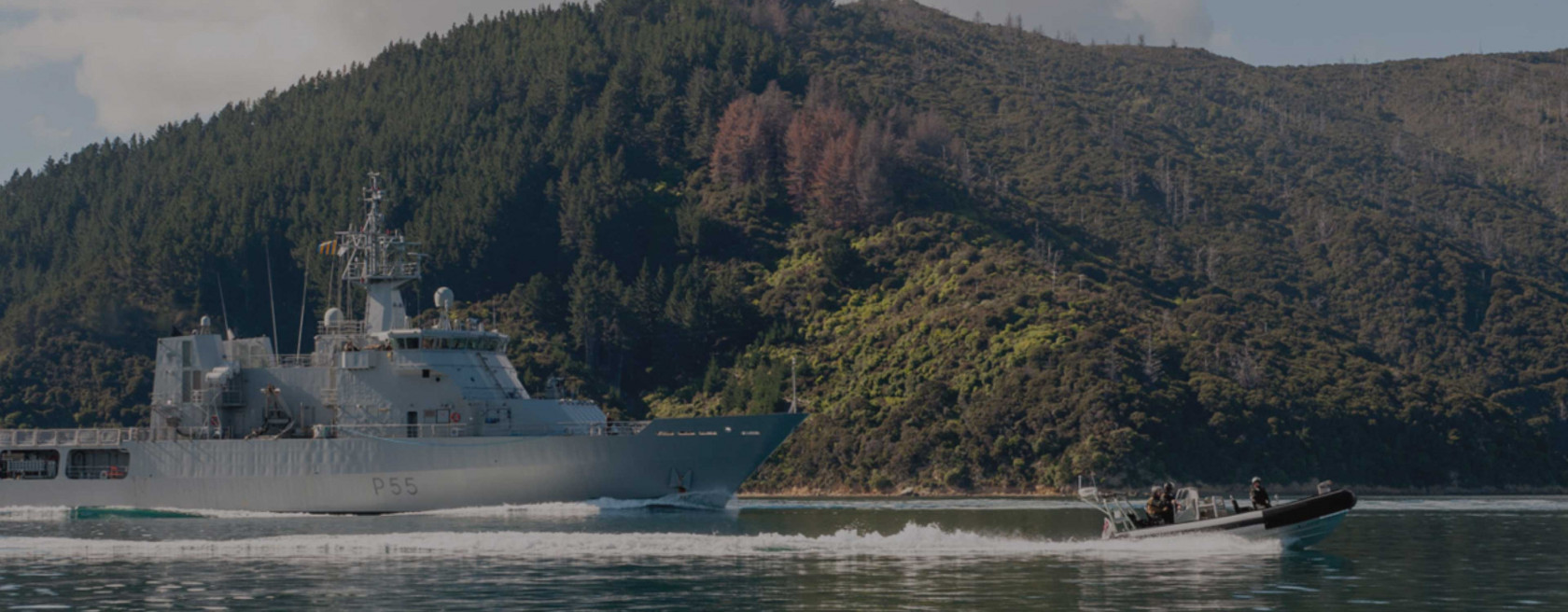
Ready to start your Navy career?
Other jobs you might like
You can also browse jobs by specialisation to narrow down your search.
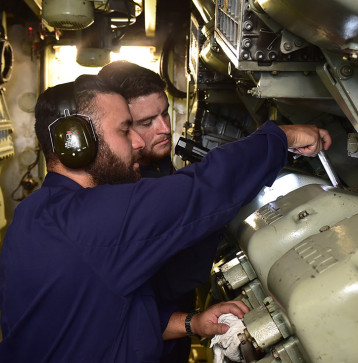
Applications Open
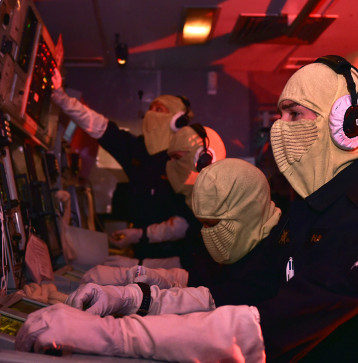
Applications Open
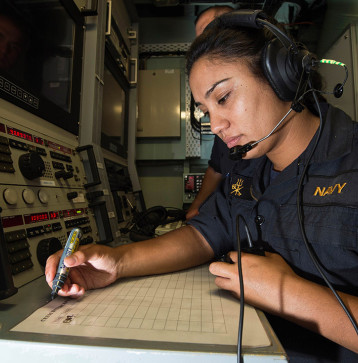
Applications Open
